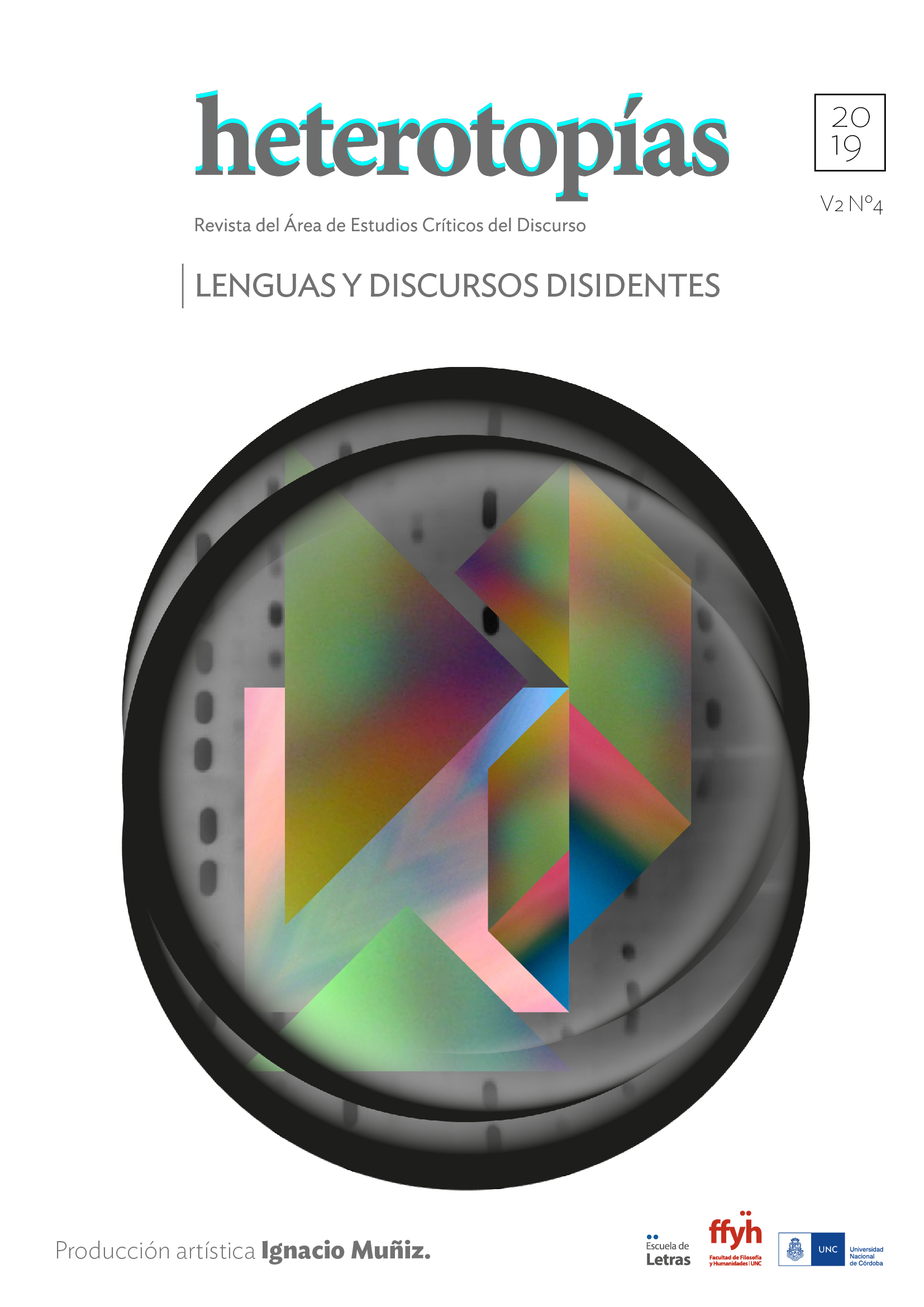Dissents in the southern border – 19th century
Main Article Content
Abstract
The unfinished and partially published manuscripts of Santiago Avendaño, interpreter and mediator between the Pampa Indians and the civil and military Christian society, were produced between 1854 and the beginning of the 1870s, in the marginal space of the southern border and from another edge, that of its author, ex-captive of hesitant identity that acted between two worlds, generating perhaps mistrust in both. In these borders, the Manuscripts elaborate a double critical gesture: rupture with the doxa that confined the Indians to barbarism, establishing their inability to access any form of civilization, and dissent, hardly manifested, with the weaknesses of the nation-state that was being formed after Caseros.
To investigate the hesitations and contradictions of a complex approach text, we have chosen, whithin the framework of the discourse analysis and according to the methodology proposed by E. Arnoux (2006), to follow the nation object and its components, narrowing that search in this article to a fragment that shows an episode of maximum tension between local officials accused of corruption and a tribe of Indian friends. The double critical gesture is articulated with the construction of the damaged homeland object. The Manuscripts show in this search a double vocation of testimony: that of the native populations of the Pampas experience, on their way to the place of ethnic minority that the budding nation state was preparing for them, and that of the positions of its author who defended confusingly an inclusive nation project.
Downloads
Article Details
Those authors who have publications with this journal, accept the following terms: Those authors who have publications with this journal, accept the following terms:
a. The authors will keep their copyright and guarantee to the journal the right of first publication of their work, which will be simultaneously subject to the Creative Commons Attribution - Non-Commercial - Share Alike (by-nc-sa) Attribution License; no commercial use of the original work or any derivative works is allowed, the distribution of which must be done with a license equal to the one that regulates the original work.
b. Authors may adopt other non-exclusive license agreements for the distribution of the published version of the work (e.g., deposit it in an institutional telematic archive or publish it in a monographic volume) provided that the initial publication in this journal is indicated.
c. Authors are allowed and recommended to disseminate their work through the Internet (e.g. in institutional telematic archives or on their website) before and during the submission process, which may lead to interesting exchanges and increase the number of citations of the published work. (See The effect of open access).
How to Cite
References
CANIGUAN, Natalia y VILLARROEL, Francisca. 2011. Muñkupe ülkantun. Que el canto llegue a todas partes. Santiago, LOM Ediciones.
CATRILEO, María. 2011. La lengua mapuche en el Siglo XXI. Editorial Universidad Austral de Chile.
CASAMIQUELA, Rodolfo. 1958. "Canciones totémicas araucanas y Gününâ Kënâ (Tehuelches Septentrionales)”. Revista del Museo de La Plata N° 4, pp. 293-314.
DE AUGUSTA, Félix José. 1910. Lecturas Araucanas. Valdivia, Imprenta de la Prefectura Apostólica.
------------------------------------. 1916. Diccionario Araucano-Español- Español-Araucano. Santiago, Imprenta Universitaria.
DE AUGUSTA, Félix y FRAUNHÄUSL, Sigfrido. 1934. Lecturas Araucanas (segunda edición), Padre Las Casas, 1934, Imprenta y Editorial "San Francisco".
DELRÍO, Walter. 2010. Memorias de expropiación. Sometimiento e incorporación indígena en la Patagonia 1872-1943. Bernal, Editorial Universidad Nacional de Quilmes.
DELRIO, WALTER. 2010b. “El genocidio indígena y los silencios historiográficos”, en Bayer, et.al. 2010. Historia de la crueldad argentina. Buenos Aires, El Tugurio.
FOUCAULT, Michel. 1979. La arqueología del saber. México, Siglo Veintiuno.
GARGAGLIONE, Julio. 2001. Ceremonias y costumbres de indígenas patagónicos reunidas en 1930. Viedma, Textos ameghinianos.
GOLLUSCIO, Lucía. 2006. El pueblo mapuche: poéticas de pertenencia y devenir. Buenos Aires, Editorial Biblos.
GOLLUSCIO, Lucía. 1989. "Los principios pragmáticos en la producción de un epew mapuche: un abordaje etnolingüístico", Caravelle N° 52, pp. 57-72.
GOLLUSCIO, Lucía. 1984. "Algunos aspectos de la teoría literaria mapuche", Actas de Lengua y Literatura Mapuche N° 1 pp. 103-112. Universidad de la Frontera.
LÖWY, Michael. 2003. Walter Benjamin Aviso de Incendio. Buenos Aires, Fondo de Cultura Económica.
MORA CURRIAO Maribel y MORAGA Fernanda. 2010. Kümedungun/ Kümewirin Antología poética de mujeres mapuche (siglos XX-XXI). Santiago, LOM Ediciones.
MOYANO, Adrián. 2013. Komutüan- Descolonizar la historia mapuche en Patagonia. Bariloche, Alum MAPU Ediciones.
RICOEUR, Paul. 2000. “Narratividad, fenomenología y hermenéutica”, Anàlisi N° 25, pp. 189-207.
ROCA, Julio A. 1879. Memoria del Departamento de Guerra, Buenos Aires, Imprenta El Porteño.
PAVEZ OJEDA, Jorge, compilador. 2008. Cartas mapuche Siglo XIX. Santiago, Ocho Libros.
PAINEQUEO PAILLÁN, Héctor. 2012. “Técnicas de composición en el ÜL (canto mapuche)”, Lingüística y Literatura, N° 26, pp. 205-228.
--------------------------------------. 1989. “Kiñe pichi ül: Consideraciones textuales y extratextuales sobre una canción mapuche”. Actas de la Lengua y Literatura
Mapuche N° 3, pp. 243-257. Universidad de la Frontera.
PICHI MALEN, Beatriz. 2004. Disco Añil. Buenos Aires, Acqua Records.
